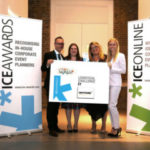
Convene and PCMA have been covering how the meetings and hospitality industry is being affected by — and responding to — the Ebola crisis. Which is obviously the biggest piece of the story for meeting professionals at this point. Another big piece? How the crisis showcases what meeting planners and meetings themselves tend to do best — respectively, rolling with the punches and serving as an important source of information, education, and discussion. For example:
Rolling with the punches. The American Bankers Association (ABA) held its 2014 Annual Convention this past Sunday–Tuesday — in Dallas, which has been ground zero for Ebola in the United States. Mincing no words, ABA posted this message high on its conference website: “As you prepare for your trip, we want to assure you that we continue to closely monitor the Ebola situation. We have talked with the leadership at the Department of Health and Human Services and the Dallas health department and continue to work with hotel officials to ensure the safety of our attendees. Your safety, comfort, and satisfaction with our program is our top priority.”
Information, education, and discussion. Meanwhile, medical and health-care conferences have been stepping up to fill the information void. When IDWeek 2014 — a collaboration between the Infectious Diseases Society of America, the Society for Healthcare Epidemiology of America, the HIV Medicine Association, and the Pediatric Infectious Diseases Society — met in Philadelphia on Oct. 8–12, it placed Ebola front and center on its program. That included extending its Opening Special Plenary Session by 30 minutes to accommodate a presentation on “Treating Patients With Ebola Virus Infection in the U.S.: Lessons Learned” by Dr. Bruce Ribner, an infectious-diseases specialist at Emory University Hospital, which in August treated two Americans who contracted Ebola in Africa. Ribner and two other physicians also participated in an emergency press conference about Ebola at IDWeek. Similarly, the American College of Emergency Physicians (ACEP) 2014 Scientific Assembly, convening in Chicago next Monday–Thursday, will present two interrelated sessions: “Ebola: Hemorrhagic Fever and the U.S. Experience” and “Inside the Hot Zone: Highly Infectious Pathogens in the Emergency Department.”
The full extent of the Ebola outbreak in the United States and Africa and throughout the rest of the world remains to be seen, but for now it’s reassuring to see that meetings and meeting planners are part of the response — and making contributions that could reduce the possibility of future outbreaks.



